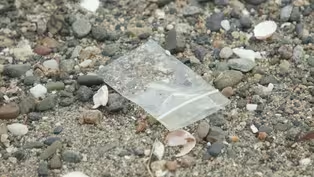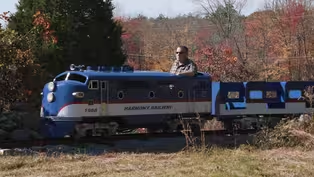
My Take: Hunting
Clip: Season 4 Episode 49 | 4m 25sVideo has Closed Captions
Nakai Northup, of the Narragansett and Mashantucket Pequot tribes, on hunting.
“I was 12 years old when I bit the heart,” said Nakai Northup, head of education at the Mashantucket Pequot Museum. On this installment of “My Take,” Northup shares how his Narragansett and Mashantucket Pequot heritage influences how he hunts in the wild.
Problems playing video? | Closed Captioning Feedback
Problems playing video? | Closed Captioning Feedback
Rhode Island PBS Weekly is a local public television program presented by Ocean State Media

My Take: Hunting
Clip: Season 4 Episode 49 | 4m 25sVideo has Closed Captions
“I was 12 years old when I bit the heart,” said Nakai Northup, head of education at the Mashantucket Pequot Museum. On this installment of “My Take,” Northup shares how his Narragansett and Mashantucket Pequot heritage influences how he hunts in the wild.
Problems playing video? | Closed Captioning Feedback
How to Watch Rhode Island PBS Weekly
Rhode Island PBS Weekly is available to stream on pbs.org and the free PBS App, available on iPhone, Apple TV, Android TV, Android smartphones, Amazon Fire TV, Amazon Fire Tablet, Roku, Samsung Smart TV, and Vizio.
Providing Support for PBS.org
Learn Moreabout PBS online sponsorship- It's something that I take a lot of pride in.
(hands clapping) My name is Nakai Northup, and this is my take on hunting.
I work here at the Mashantucket Pequot Museum & Research Center.
See?
The mouth is right here.
And I also own a business called Res Life Outdoors, which promotes Indigenous perspectives on hunting, fishing, and land stewardship.
I come from the Mashantucket Pequot Tribal Nation, and the Narragansett Nation here in the northeast.
I've been hunting my entire life.
It's been something that was ingrained in me really young.
It's been something my family have done for generations.
The past couple years I've been leaning more towards hunting with bows, almost solely hunting with bow and arrow.
(antlers clicking) And it's something that my ancestors were doing.
They were hunting with bows and arrows, and I use modern compound bows, but it's the same roots.
(water splashing) And this is something that's kind of widespread throughout Indigenous communities, is that first deer that you harvest you have to take that heart and you have to bite it.
You have to give your prayer, but you have to bite that heart fresh out, and you're taking in the strength and the qualities of that animal, we say.
My first deer, I was 12 years old, and when I bit the heart, it's an interesting experience.
I like it cooked far better.
Salt and pepper go a long way, and a little heat.
Being around my father, you know, I had to have a straight good poker face, but I would've been perfectly okay spitting it out.
(birds chirping) One of my favorite things about being in the woods is hearing it come to life.
So as the sun rises, you hear all the songbirds start to sing.
You hear your squirrels jumping around, and I'm specifically listening for white-tailed deer to come in.
So I'm listening for one, two, three steps, and then a stop and a pause.
Deer move slowly through the woods because they're very cautious and they are built to survive.
White-tailed deers, really one of their best weapons against a hunter, is their nose.
If they get your wind, they'll be long gone before you even get to lay eyes on them.
(leaves crunching) Really, one of the most important things that I was ever taught is that it takes life to make life.
If we ever harvest anything, have it be a deer, have it be a blueberry on a bush or a mushroom on a tree, we'll leave tobacco behind and we'll say a prayer for whatever we're harvesting because picking a mushroom is killing that mushroom.
Picking a berry is taking life from that plant.
I always tell any animal that I harvest that I'm thankful for its sacrifice so I can feed my family so that we can have life.
And I'm thankful in that I'm gonna use your hide.
This isn't where you end.
This is another part.
(hands clapping) My name is Nakai Northup, and this was my take on hunting.
Green Seeker: Plastic Pollution
Video has Closed Captions
Clip: S4 Ep49 | 9m 36s | Researchers explore the effects of microplastics on the environment and mammals. (9m 36s)
Video has Closed Captions
Clip: S4 Ep49 | 9m 4s | Trending in the workforce: folks fifty-plus leaving a long-time career for a new dream job (9m 4s)
Providing Support for PBS.org
Learn Moreabout PBS online sponsorship
- News and Public Affairs

Top journalists deliver compelling original analysis of the hour's headlines.

- News and Public Affairs

FRONTLINE is investigative journalism that questions, explains and changes our world.












Support for PBS provided by:
Rhode Island PBS Weekly is a local public television program presented by Ocean State Media

